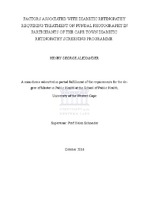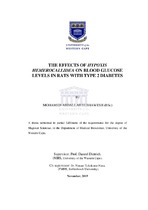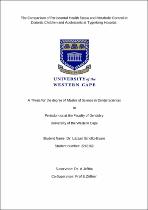Factors associated with diabetic retinopathy requiring treatment on fundal photography in participants of the Cape Town diabetic retinopathy screening programme
Abstract
BACKGROUND AND RATIONALE: The Cape Town Metro District Health Service (MDHS) has introduced a Diabetic RetinopathyScreening (DRS) programme incorporating retinal fundal photography in diabetic services at primary health care (PHC) facilities. Hitherto, coverage of the DRS programme has been less than optimal in part due to volumes of diabetic patients attending PHC facilities. The aim of this study was to identify possible sub-groups of patients, attending the Cape Town DRS Programme, who are at most risk of diabetic retinopathy and might be prioritised for early diabetic retinopathy detection and subsequent sight-saving treatment. METHODOLOGY: A case-control study of risk factors for treatment-requiring diabetic retinopathy was conducted. This research sampled participants from the DRS programme provided by the MDHS eye care team to Type II diabetics attending public PHC facilities within the Klipfontein and Mitchells Plain Sub-Districts. Based on fundal images, cases were selected as those requiring ophthalmological treatment; and controls (three matched per case by area of residence) as those judged as not requiring ophthalmological treatment for diabetic retinopathy. Data on possible risk factors (clinical, laboratory) were extracted from the patients' folders.
RESULT: The study included 453 participants, of whom 113 (24.9%) were cases and 340 (75.1%) were controls. Three factors were significantly associated with treatment-requiring diabetic retinopathy on multivariate analysis: Insulin dependency (OR of 2.96, 95% CI: 1.75 – 5.00); duration of diabetes of more than 10 years (OR of 3.44, 95% CI: 2.06 – 5.74) and sustained hyperglycaemia over the past six months (OR of 3.73, 95% CI: 1.69 – 8.22). A screening algorithm combining these criteria had a sensitivity of 61.2% (95% CI: 51.9 – 70.5).
CONCLUSION: The findings indicate that a sub-set of patients attending the DRS programme in the Klipfontein and Mitchells Plain Sub-Districts have a greater likelihood of presenting with treatment-requiring diabetic retinopathy. Further research is required to develop a tool that is sufficiently sensitive to safely prioritise patients for fundal screening.
Collections
Related items
Showing items related by title, author, creator and subject.
-
The effects of hypoxis hemerocallidea on blood glucose levels in rats with Type 2 diabetes
Elshawesh, Mohamed Abdallah (University of the Western Cape, 2015)About 180 million people have been estimated to suffer from type 2 diabetes (T2DM) in 2006 and the annual death rate due to this disease was 3 million by that time. More than 400 medicinal plants used for the treatment ... -
The role of culture in mobile application adoption amongst diabetes patients in previously disadvantaged communities in the Western Cape
Jacobs, Miriam (University of Western Cape, 2021)Introduction: Diabetes mellitus is a global health problem with a high mortality rate. Self-management is an essential part of diabetes management and it includes self-care behaviour tasks such as healthy eating, being ... -
The comparison of periodontal health status and metabolic control in diabetic children and adolescents at Tygerberg hospital
Scholtz-Evans, Lèzaan (University of Western Cape, 2021)Diabetes Mellitus (DM) is a well-known risk factor for Periodontal disease. Research has established that the prevalence of Periodontal disease is directly related to the glycaemic control of DM in adults and only a few ...




